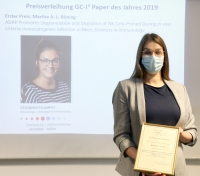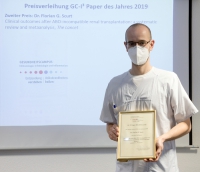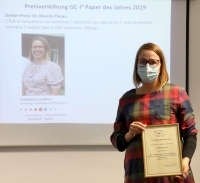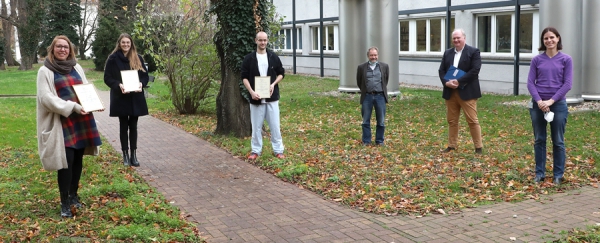Prof. Dr. Peter Mertens
Department of Nephrology, Diabetology and Endocrinology
Prof. Dr. Dimitrios Mougiakakos
Department of Hematology and Oncology
Prof. Dr. Christoph Lohmann
Department of Orthopedics
For the fourth time the Health Campus Immunology, Infectiology and Inflammation awards the title "GC-I³ Paper of the Year" to three outstanding publications of its members. The steering committee of the GC-I³ chose the best three works out of nine applications, all members of the GC-I³ subsequently voted for the order of those three.
 The first prize went to Martha Böning. The PhD student is working in the group of Prof. Dunja Bruder (Institute of Medical Microbiology and Hospital Hygiene) since May 2017. Her prize-winning publication „ADAP Promotes Degranulation and Migration of NK Cells Primed During in vivo Listeria monocytogenes Infection in Mice“, was published in „frontiers in Immunology“. The early career scientist could show that the adhesion and degranulation promoting adapter protein (ADAP) has important functions in natural killer cells (NK cells) under physiological conditions. NK cells are cells of the innate immune system; they can recognize and eliminate tumor cells as well as cells that have been infected by viruses and intracellular pathogens. So far there are only a few publications about the role of ADAP in NK cells and these are contradictory and based solely on in vitro experiments. In their study the team could now show in an animal model that ADAP in NK cells has at least two important functions under physiological conditions. It is responsible for the efficient migration of NK cells and it contributes to their main function of killing tumor cells and infected cells efficiently.
The first prize went to Martha Böning. The PhD student is working in the group of Prof. Dunja Bruder (Institute of Medical Microbiology and Hospital Hygiene) since May 2017. Her prize-winning publication „ADAP Promotes Degranulation and Migration of NK Cells Primed During in vivo Listeria monocytogenes Infection in Mice“, was published in „frontiers in Immunology“. The early career scientist could show that the adhesion and degranulation promoting adapter protein (ADAP) has important functions in natural killer cells (NK cells) under physiological conditions. NK cells are cells of the innate immune system; they can recognize and eliminate tumor cells as well as cells that have been infected by viruses and intracellular pathogens. So far there are only a few publications about the role of ADAP in NK cells and these are contradictory and based solely on in vitro experiments. In their study the team could now show in an animal model that ADAP in NK cells has at least two important functions under physiological conditions. It is responsible for the efficient migration of NK cells and it contributes to their main function of killing tumor cells and infected cells efficiently.
 The second prize was awarded to Dr. Florian Scurt (resident/Assistenzarzt at the Clinical department of Nephrology and Hypertension, Diabetology and Endocrinology) for his paper „Clinical outcomes after ABO-incompatible renal transplantation: a systematic review and meta-analysis“, which was published in „The Lancet“. For patients with end-stage renal disease a renal replacement by transplantation is the best possible therapy. Unfortunately, this option is not universally available: the population is ageing, more and more patients are dependent on dialysis and at the same time the willingness to donate organs is decreasing. Usually, one tries to match the blood group of donor and recipient as closely as possible to prevent organ rejection by the immune system. However, especially in case of living donors, ABO-incompatible renal transplantation (ABOi-rTx), has become a standard procedure. The clear advantage is the much bigger pool of potential donors, but recipients of an ABOi-rTx have to get extensive medication to prevent their immune system from attacking the kidney graft. Dr. Scurt and his team found in a comprehensive metaanalysis of numerous studies that compared to ABO-compatible renal transplantation (ABOc-rTx) the survival of patients and transplants is slightly reduced in ABOi-rTx. Furthermore, there is a slightly increased risk of complications and organ rejections. Up to now the results regarding these parameters have been contradictory, so Dr. Scurt hopes that his analysis will help physicians to asses the benefit-risk-ratio of an ABOi-rTx more accurately and to prepare patients with renal insufficiency optimally for ABOi-rTx through medication before and after the transplantation.
The second prize was awarded to Dr. Florian Scurt (resident/Assistenzarzt at the Clinical department of Nephrology and Hypertension, Diabetology and Endocrinology) for his paper „Clinical outcomes after ABO-incompatible renal transplantation: a systematic review and meta-analysis“, which was published in „The Lancet“. For patients with end-stage renal disease a renal replacement by transplantation is the best possible therapy. Unfortunately, this option is not universally available: the population is ageing, more and more patients are dependent on dialysis and at the same time the willingness to donate organs is decreasing. Usually, one tries to match the blood group of donor and recipient as closely as possible to prevent organ rejection by the immune system. However, especially in case of living donors, ABO-incompatible renal transplantation (ABOi-rTx), has become a standard procedure. The clear advantage is the much bigger pool of potential donors, but recipients of an ABOi-rTx have to get extensive medication to prevent their immune system from attacking the kidney graft. Dr. Scurt and his team found in a comprehensive metaanalysis of numerous studies that compared to ABO-compatible renal transplantation (ABOc-rTx) the survival of patients and transplants is slightly reduced in ABOi-rTx. Furthermore, there is a slightly increased risk of complications and organ rejections. Up to now the results regarding these parameters have been contradictory, so Dr. Scurt hopes that his analysis will help physicians to asses the benefit-risk-ratio of an ABOi-rTx more accurately and to prepare patients with renal insufficiency optimally for ABOi-rTx through medication before and after the transplantation.
 Dr. Mandy Pierau (PostDoc at the Department of Experimental Paediatrics and Neonatalogy) was presented with the third prize for her publication „CTLA-4-competent conventional T-cells back up regulatory T-cells to restrain memory T-helper type 2 cell responses“ in „Allergy“. Nowadays immunologists know that there are many different kinds of T cells, which have various important functions in the immune system. Activated Th2 cells are important during the defense against extracellular bacteria and worms and protect against toxins. But when their activation is running out of control they can promote allergic inflammatory reactions such as asthma. So their activation has to be carefully regulated. It has been known that regulatory T cells (Tregs) as well as activated conventional T cells (Tconv) carry the molecule CTLA-4 on their surface. Both cell types regulate the activity and differentiation of Th2 T cells. Dr. Pierau has been analysing the interplay of Tregs and Tconv and the role of CTLA-4 during this process. She could show in vitro and in vivo that both cell types can keep Th2 cells in check, however Tregs are positioned above Tconv in this hierarchy. Tconv take over this important function when Tregs are no longer working sufficiently - for example because their number or function is reduced. In a manner of speaking they are the emergency brake, taking over when the normal brake is not working properly anymore.
Dr. Mandy Pierau (PostDoc at the Department of Experimental Paediatrics and Neonatalogy) was presented with the third prize for her publication „CTLA-4-competent conventional T-cells back up regulatory T-cells to restrain memory T-helper type 2 cell responses“ in „Allergy“. Nowadays immunologists know that there are many different kinds of T cells, which have various important functions in the immune system. Activated Th2 cells are important during the defense against extracellular bacteria and worms and protect against toxins. But when their activation is running out of control they can promote allergic inflammatory reactions such as asthma. So their activation has to be carefully regulated. It has been known that regulatory T cells (Tregs) as well as activated conventional T cells (Tconv) carry the molecule CTLA-4 on their surface. Both cell types regulate the activity and differentiation of Th2 T cells. Dr. Pierau has been analysing the interplay of Tregs and Tconv and the role of CTLA-4 during this process. She could show in vitro and in vivo that both cell types can keep Th2 cells in check, however Tregs are positioned above Tconv in this hierarchy. Tconv take over this important function when Tregs are no longer working sufficiently - for example because their number or function is reduced. In a manner of speaking they are the emergency brake, taking over when the normal brake is not working properly anymore.
Unfortunately a public awards ceremony was not possible this year, nevertheless all three winners received a certificate and prize money of 1000, 500 or 250 €, respectively. These were awarded by Prof. Dr. med. Christoph Lohmann, speaker of the GC-I³ on the 17th of November during a short ceremony. Prof. Lohmann revealed that the voting was very close this year, emphasizing the high quality of all three winning publications.

The steering committee of the GC-I³ is pleased that the "Paper of the Year" is becoming a tradition in the Health Campus and has published a new call for the GC-I³ Paper of the Year 2020.
Prof. Dr. Peter Mertens
Department of Nephrology, Diabetology and Endocrinology
Prof. Dr. Dimitrios Mougiakakos
Department of Hematology and Oncology
Prof. Dr. Christoph Lohmann
Department of Orthopedics
Last Modification: 21.10.2022 - Contact Person: